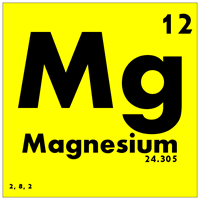Magnesium
There are at least 350 enzyme systems in your body that require magnesium for proper function. Perhaps even more importantly, the quartet of calcium, vitamin D, K2, and magnesium all work together synergistically. Magnesium is an important electrolyte used by virtually all of the bodily enzymes. It maintains fluid balance, gives energy to the cells (ATP), activates creatine, improves sleep quality, and increases the amount of free testosterone. Magnesium glycinate is the best form of oral magnesium in terms of absorption, whereas oxide is the worst.
An adult body contains approximately 25g magnesium, with 50% to 60% present in the bones and most of the rest in soft tissues . Magnesium level is largely controlled by the kidneys, which typically excretes about 120 mg magnesium into the urine each day. Low levels of magnesium have been associated with a number of conditions and diseases.
The RDA for magnesium is 400mg from all sources. It can leave the body very quickly, so a regular daily intake is imperative. The upper limit is not set, but too much has a laxative effect (Magnesium citrate is used medicinally as a saline laxative and to completely empty the bowel prior to a major surgery or colonoscopy).
Magnesium deficiency
Magnesium deficiency has been linked to a number of health conditions, such as heart disease, migraines, strokes, insulin resistance, type 2 diabetes, Alzheimer’s and attention deficit hyperactivity disorder. Eating plenty of foods rich in magnesium is key to keeping your magnesium levels up. For men, it’s recommended to get 400–420 milligrams per day, and women need 310–320 milligrams daily.

Magnesium and the heart
Magnesium Reduces Heart Disease Risk. Inadequate magnesium intake, or deficiency in total body magnesium, increases the risk of cardiovascular diseases such as heart attacks, strokes and arrhythmias. People who end up in hospital with a heart attack are given magnesium. Besides the proven benefits for victims of a heart attack, another study showed people who were given IV magnesium had a 76% reduction in death from a fatal blood clot (the same study showed that aspirin made no difference). People who take diuretic drugs or drink a lot of alcohol lose magnesium at a higher rate.
So...... EAT FOODS RICH IN MAGNESIUM & TAKE A DAILY SUPPLEMENT.
Magnesium Foods
- Pumpkin seeds - 100g: 262mg (66% RDA)
- Spinach, cooked - 100g: 160mg (40% RDA)
- Cashews - 100g: 256 milligrams (64% RDA)
- Brazil nuts - 2 nuts (10g): 40mg (10% RDA)
- Dark chocolate -100g: 228 milligrams (57% RDA)
- Almonds - 100g: 277 milligrams (69% RDA)
- Black beans - 1/2 cup: 60 milligrams (15 percent RDA)
- Avocado - 1 medium: 58 milligrams (15 percent RDA)
- Yogurt or kefir - 1 cup: 46.5 milligrams (12 percent RDA)
- Banana - 1 medium: 32 milligrams (8 percent RDA)
- Electrolyte water (100% RDA - read more here)
Magnesium is critically important and should be in your top 3 for supplements. A good dose of at least 400mg should be taken each day, as you can't always trust the magnesium content of foods. We recommend buying a 500g or 1 kilo bulk powder, such as food grade magnesium sulphate (super cheap) or the superior magnesium glycinate (Magnesium glycinate has been shown to have a variety of benefits, including a calming effect on your brain due to the presence of glycine. It can help relieve anxiety and promote better sleep).
Studies have found that magnesium in the aspartate, citrate, lactate, and chloride forms is absorbed more completely and is more bioavailable than magnesium oxide and magnesium sulphate. Multivitamins probably won't have enough (Centrum only has 80mg as Magnesium oxide, which is the cheapest and least bioavailable). Magnesium absorption is impeded with the use of supplemental iron. If you take calcium supplements, your need for magnesium increases, and in fact calcium will not be properly absorbed or metabolised if adequate magnesium is missing, and will mostly end up dangerously deposited in soft tissues. Magnesium is responsible for converting vitamin D to the active form that allows calcium to be absorbed and also regulates calcium transport to the bones and teeth. Lactose is another inhibitor of magnesium absorption, so don't take a magnesium supplement with milk. Magnesium is also lost in sweat, so athletes or people who have hard manual jobs will lose more magnesium.
- Bulk Powders (UK supplier): 500mg Magnesium glycinate tablets (sadly only 100mg of Mg).
- 300g bulk powder (UK supplier): Magnesium glycinate.
- Magnesium Bisglycinate (UK): 2500mg - 250mg Magnesium) 240 Capsules
